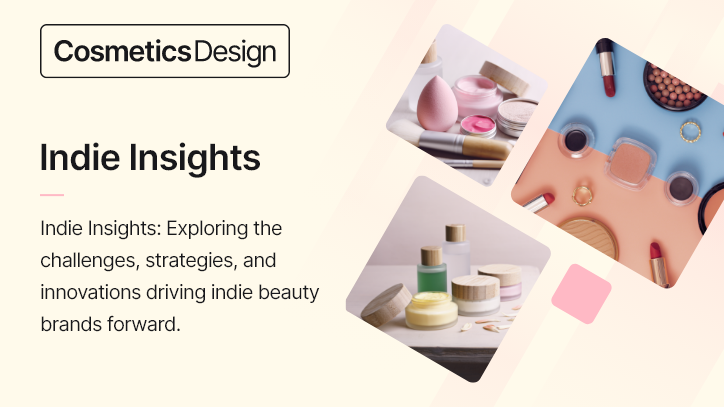
Sustainability has become a key focus within the beauty industry as brands seek to meet the growing demand for environmentally responsible products. Indie beauty brands, known for their flexibility and innovation, are increasingly integrating sustainable practices into their operations. This month’s CosmeticsDesign Indie Insights column examines how indie brands are addressing sustainability in areas such as packaging, ingredient sourcing, and product development.
We spoke to Dr. Robb Akridge, CEO and founder of OPULUS Beauty Labs, who shared insights into how his company is reducing environmental impact through innovative packaging solutions and sustainable business practices, while also meeting the expectations of eco-conscious consumers.
CDU: Sustainability is a key aspect of Opulus Beauty Labs. Can you share how sustainability was integrated into the brand’s mission from its inception?
Dr. Robb Akridge (RA): The original concept of OPULUS Beauty Labs is centered on potent single dose cosmetics while reducing environmental impact. Inspired by chocolate confectionaries with a hard shell and creamy center, we developed single-dose cosmetic capsules using a unique crystalline matrix.
This material is formed by processing cosmetic ingredients similarly to chocolate tempering, creating stable capsules that house potent formulations. Unlike single-serve coffee pods, which use plastic, our capsules—called Opoules—are completely plastic-free. After just 100 seconds in our handheld device, the shell melts and becomes part of the formula, leaving no waste—just a paper wrapper.
CDU: How do you define sustainability for Opulus Beauty Labs, and how does this align with consumer expectations, especially among eco-conscious customers?
RA: For us, sustainability means reducing environmental impact wherever possible. While some systems, like shipping, aren’t always eco-friendly, our focus remains on potent, single-dose cosmetics freshly activated at use.
We prioritize doing the right thing whenever we can—like using dissolvable packing material instead of plastic, despite higher costs. No company is perfectly sustainable, but transparency and continuous improvement build consumer trust and show our commitment to minimizing environmental impact wherever we can.
CDU: Your brand’s use of concentrates is an innovative approach to minimizing packaging waste. Can you walk us through how this packaging design was developed and the challenges you faced in creating it?
RA: We offer two product formats: capsules and a credit card-sized bar called a concentrate. Both use a stable crystalline matrix, requiring minimal packaging—just a paper wrap and a sturdy paper box.
While paper waste does have some environmental impact, it’s much less than plastic. Leveraging chocolate industry expertise in packaging, we faced few challenges but had to test compatibility with different paper types to ensure long-term shelf life. Our approach minimizes packaging while maintaining product stability and sustainability.
CDU: What role does consumer education play in your sustainable packaging strategy? How do you communicate the benefits of your packaging to customers?
RA: Education is key whenever an innovation enters the marketplace. Our primary focus when educating the consumers is talking about our patented technology, and the benefits of our potent single dose cosmetics.
Secondarily we then point out that because of our technology we have broken the bottle meaning…we no longer need plastic packaging. When I go through this approach in person with someone new, they are sold on the technology and products, and then when I mention sustainability it is that one additional item that may convince them to purchase.
CDU: As an indie beauty brand, how does Opulus Beauty Labs push the boundaries of sustainability within the beauty industry, and what do you think larger brands could learn from your approach?
RA: Everyone is striving to reduce their environmental impact by minimizing plastic packaging. Many switch to thinner plastic or refillable containers with pouches—still made of plastic.
Large companies genuinely aim to cut waste, but their costly infrastructure relies on plastic-driven systems. What they can learn from us is to rethink how cosmetics are made without relying on plastic. We’ve eliminated the bottle entirely, proving it’s possible to innovate without compromising on sustainability.
CDU: What kind of feedback have you received from customers about your sustainability initiatives, and how do you ensure these resonate with their values?
RA: Everyone loves the lack of plastic, and they love our elegant paper packaging. However, we have noticed several things.
People care about the environment, but results matter more. Younger consumers immediately notice our plastic-free packaging, saying, “You don’t have any bottles.”
Mature consumers love our paper packaging and results but don’t notice the lack of plastic until it’s pointed out. This shows different audiences have varying levels of environmental awareness. To effectively reach each group, we tailor our messaging—focusing on both sustainability and product performance, rather than just one topic.
CDU: Looking ahead, are there any future sustainability goals or initiatives that Opulus Beauty Labs is working toward?
RA: We have two main technologies: our cosmetics and the Activator appliance. The Activator transforms our products into warm, ready-to-apply topicals within 100 seconds. It’s rechargeable, easy to use (one button), and comes with a 2-year warranty.
Although it’s made of plastic, it’s designed to be your long-lasting cosmetic jar. Our next sustainability goal is to redesign it with fewer parts and easier assembly to reduce environmental impact. We’re committed to continuous improvement as resources allow.

